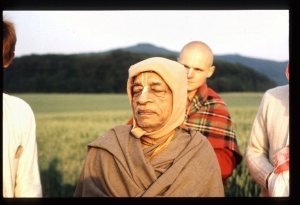SB 10.20.45: Difference between revisions
No edit summary |
(Vanibot #0054 edit - transform synonyms into clickable links, which search similar occurrences) |
||
| Line 23: | Line 23: | ||
<div class="synonyms"> | <div class="synonyms"> | ||
''āśliṣya'' | ''[//vanipedia.org/wiki/Special:VaniSearch?s=āśliṣya&tab=syno_o&ds=1 āśliṣya]'' — embracing; ''[//vanipedia.org/wiki/Special:VaniSearch?s=sama&tab=syno_o&ds=1 sama]'' — equal; ''[//vanipedia.org/wiki/Special:VaniSearch?s=prasūna&tab=syno_o&ds=1 prasūna]-[//vanipedia.org/wiki/Special:VaniSearch?s=vana&tab=syno_o&ds=1 vana]'' — of the forest of flowers; ''[//vanipedia.org/wiki/Special:VaniSearch?s=mārutam&tab=syno_o&ds=1 mārutam]'' — the wind; ''[//vanipedia.org/wiki/Special:VaniSearch?s=janāḥ&tab=syno_o&ds=1 janāḥ]'' — the people in general; ''[//vanipedia.org/wiki/Special:VaniSearch?s=tāpam&tab=syno_o&ds=1 tāpam]'' — suffering; ''[//vanipedia.org/wiki/Special:VaniSearch?s=jahuḥ&tab=syno_o&ds=1 jahuḥ]'' — were able to abandon; ''[//vanipedia.org/wiki/Special:VaniSearch?s=gopyaḥ&tab=syno_o&ds=1 gopyaḥ]'' — the ''gopīs''; ''[//vanipedia.org/wiki/Special:VaniSearch?s=kṛṣṇa&tab=syno_o&ds=1 kṛṣṇa]'' — by Lord Kṛṣṇa; ''[//vanipedia.org/wiki/Special:VaniSearch?s=hṛta&tab=syno_o&ds=1 hṛta]'' — stolen; ''[//vanipedia.org/wiki/Special:VaniSearch?s=cetasaḥ&tab=syno_o&ds=1 cetasaḥ]'' — whose hearts. | ||
</div> | </div> | ||
Latest revision as of 18:35, 17 February 2024

His Divine Grace
A.C. Bhaktivedanta Swami Prabhupada
A.C. Bhaktivedanta Swami Prabhupada
Please note: The synonyms, translation and purport of this verse were composed by disciples of Śrīla Prabhupāda
TEXT 45
- āśliṣya sama-śītoṣṇaṁ
- prasūna-vana-mārutam
- janās tāpaṁ jahur gopyo
- na kṛṣṇa-hṛta-cetasaḥ
SYNONYMS
āśliṣya — embracing; sama — equal; prasūna-vana — of the forest of flowers; mārutam — the wind; janāḥ — the people in general; tāpam — suffering; jahuḥ — were able to abandon; gopyaḥ — the gopīs; kṛṣṇa — by Lord Kṛṣṇa; hṛta — stolen; cetasaḥ — whose hearts.
Translation and purport composed by disciples of Śrīla Prabhupāda
TRANSLATION
Except for the gopīs, whose hearts had been stolen by Kṛṣṇa, the people could forget their suffering by embracing the wind coming from the flower-filled forest. This wind was neither hot nor cold.